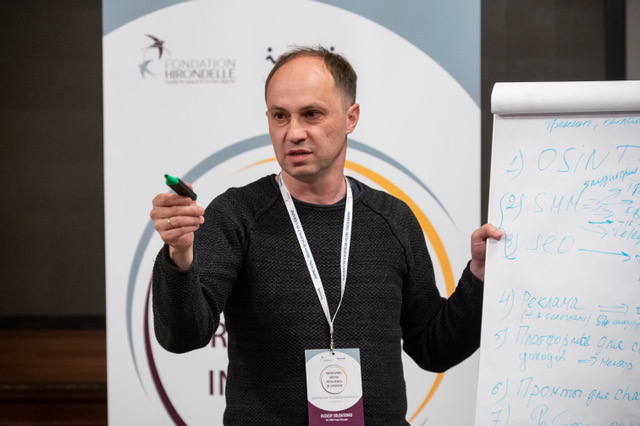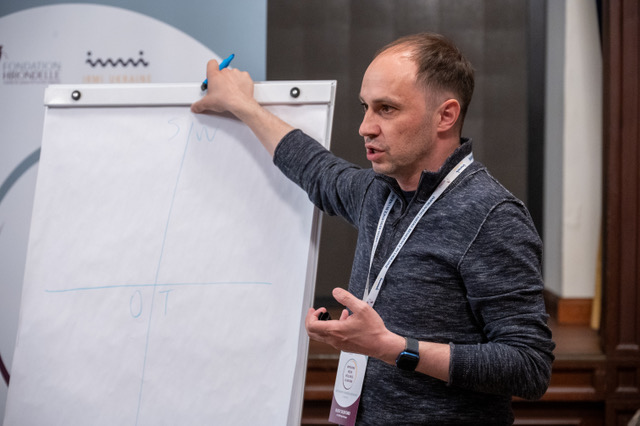
Oleksiy Soldatenko is co-founder and Programs Director of the International Institute for Regional Media and Information (IRMI, Ukraine). He is a media and Public Relations expert, a trainer and training organizer with more than 30 years experience.

Your country was attacked in two steps. All started 2014, with no big international reactions after the first actions by Russian-backed separatists. After 2022 the international community reacted. How you comment the fact, that after the first attacks on your country the media in many countries were silent or all ended with only few short reports from Ukraine and occupied territories? The media did not show so big interest. How you comment this.
I think for the same reason that the international community turned a blind eye to Russia’s occupation of parts of Moldova and Georgia. Even then, many experts were already saying: Ukraine will be next. And in 2014, the Russians occupied Crimea. The world thought that the Kremlin’s appetite would stop there, but the full-scale war that began in February 2022 sobered everyone up. It finally became clear that Russia is not a local threat on the scale of the post-Soviet space. It is a challenge to global security and the system of widely shared values and norms. The threatening rhetoric of Russian public figures and propagandists is now addressed to many countries of the democratic world. In addition, what the Russians are doing in Ukraine is shocking the majority of people. Because no one could have imagined that this was in principle possible in 21st century Europe.
You live in Kharkiv , it is only 30 km from Russian border and not so fare from the city of Belgorod in Russia. It means, you have the possibility to follow Russian propaganda media. What is the feeling when you are listening this propaganda news and reports?
You do not need to be in a particular city to see comments by odious Russian propagandists about the events in Ukraine. And let’s not call it journalism, because journalism is a profession that helps people to make decisions and organise their lives, to realise their human potential. For this purpose, facts are collected and disseminated. Without journalism, society cannot live. With misinformation, it cannot survive. Manipulation of information is a crime. That is why in post-war Germany, some journalists were trialed and many of them were barred from the profession.
How are journalists in your country supporting the resistance against the Russian aggression.
First of all, they remain journalists. Believe me, it is very difficult to try to be impartial and to stay within professional standards when your homes and towns are being destroyed and when the real terror is being committed against civilians. And still, thousands of our colleagues understand the clear borderline between journalism and propaganda. And they do their best not to cross it.
Is it possible to be independent and professional journalist during the war?
It is possible, if you are guided by the public interest. However, when an unjust war is going on in your country, when it has a terrorist character, when civilians are suffering and children are being kidnapped out of the country, depriving them of their families, when nuclear weapons are being blackmailed against a state that voluntarily gave up such weapons in exchange for security guarantees, including from the country that violated them, it is difficult to be impartial. It is difficult to avoid hate speech, to restrain emotions. Journalists in the occupied territories are being killed and persecuted. Our colleague from Melitopol was kidnapped, and we still do not know what happened to her. And this is not the only case. People are stopped and their phones are looked through, and they are severely punished if any information from Ukraine is found. But people need this information, and journalism is alive. It’s hard to tell everything. How newspapers were delivered to bomb shelters, how stringers travelled on bicycles kilometres away from their settlements in search of communications to transmit information to newsrooms. Many outlets that have been moved to relatively safe locations continue to reach their readers in Melitopol and elsewhere. They are transferring to multimedia platforms, learning mobile journalism. Just one of many examples. Bakhmut has been destroyed to the ground, erased from the face of the earth. Its inhabitants are now spread across different cities of Ukraine, and even other countries. But the local newspaper “Vpered” continues to be published for them all, preserving a virtual community. It started a dialogue with its readers about their vision of the city’s future: what it will be like after the victory.
How regional and local media can survive during the war?
It is difficult. Limited access to sources of information due to occupation, specifics of martial law. The crisis of the economy has limited the possibilities of financing. Some newsrooms offices have been destroyed, equipment has been lost. Many of the media lost their experienced staff. Some went to the army. Women have taken their children to safe places. Those who work need to learn new skills and knowledge. They need to think about personal safety during the field missions, to deal with professional burnout, to work with sources that cannot be named, so as not to endanger their colleagues. How to get your publications to readers. How to master new formats to deliver information to their audiences, who are now spread across the country and around the world. There are many issues we are working on and trying to help newsrooms address.
How is to publish a newspaper in a war? To produce radio and TV programme? Is this possible? The conditions are not normal.
The editor of the newspaper Mayak from Kharkiv region told how she worked round the clock to prepare the issue of the newspaper during the first days of the war. The electricity was constantly failing. She left a light lamp on. She woke up when the light came on and worked. She slept when there were no electricity and no bombing. In order to keep the media alive, editors of print media first of all began to master multimedia formats, to create convergent newsrooms, to learn mobile journalism. But if you ask me what is the most important thing in everything, I will tell you: understanding that your readers need you, and the desire to remain journalists.
How international community can help media and journalist in Ukraine in this moment?
The international community is already helping. With finances, professional equipment, equipment that helps ensure stable communication, training, psychological support. And most importantly, with our media understanding that Ukrainian journalists are not left on their own.
Finally, how is the International Institute for Regional Media and Information – IRMI – working now under war conditions.
Since the beginning of the full scale war, together with our foreign partners, we have been helping Ukrainian media. At the beginning, it was purely financial assistance. It was necessary simply to help media outlets to survive. Now we have rethought this work. It has become a complex approach. Not only finances, but also mentoring, capacity development programs, technical support, on-demand consultations. We perform constant needs assessments and adapt our programmes very flexibly to current problems and challenges. We help media outlets to master new formats, work on strategic planning and editorial policies. We are very proud that even in these times many of our media partners are developing codes of ethics and publishing them. We consider this an important step towards building trustful and transparent relations with their readers and viewers.
It is also important to learn how to counter aggressive Russian propaganda aimed at dividing people and deepening cracks in society. It works not only in Ukraine, but also in European communities that have welcomed and protected Ukrainian refugees. In partnership with INCAS, we have studied the situation in six Eastern European countries and developed recommendations on how to counter disinformation and misinformation.
Our main efforts are focused on local and hyperlocal media in eastern and southern Ukraine. Media from Kherson, Bakhmut, Volnovakha and many other cities most affected by the war. Together with the Fondation Hirondelle (Switzerland) and with the support of Swiss Solidarity, we are implementing a comprehensive project to support the sustainability of Ukrainian media. We see our task in ensuring that they not only survive the war, but become stronger. The society needs strong professional media to restore an independent Ukraine, to preserve democratic values and instruments.
We have no doubt that Ukraine will win this war. But it will also have to win the peace. Therefore, together with our partners from Fondation Hirondelle, we are already thinking about the role of media in strengthening social cohesion in Ukraine. There are certain plans that will definitely be implemented in the near future.
